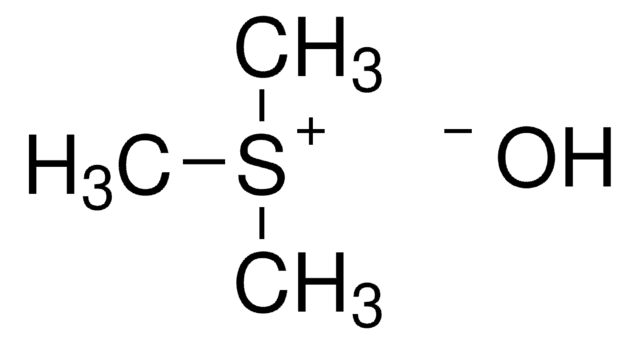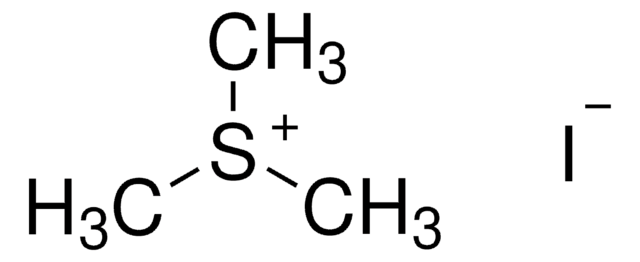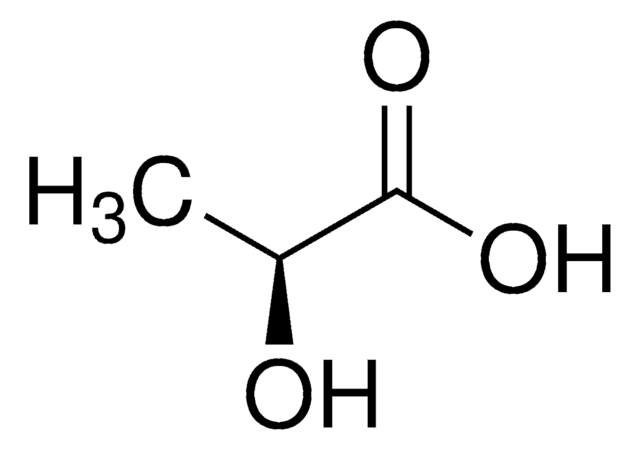79266
Trimethylphenylammonium hydroxide solution
~0.5 M (CH3)3N(OH)C6H5 in methanol, LiChropur™
동의어(들):
Phenyltrimethylammonium hydroxide, TMAH
로그인조직 및 계약 가격 보기
모든 사진(1)
About This Item
Linear Formula:
(CH3)3N(OH)C6H5
CAS Number:
Molecular Weight:
153.22
Beilstein:
3917033
MDL number:
UNSPSC 코드:
41115710
PubChem Substance ID:
NACRES:
NA.22
추천 제품
Grade
derivatization grade ((GC derivatization))
Quality Level
양식
liquid
품질
LiChropur™
반응 적합성
reagent type: derivatization reagent
reaction type: Esterifications
농도
~0.5 M (CH3)3N(OH)C6H5 in methanol
기술
gas chromatography (GC): suitable
불순물
≤0.2% halides (as chloride)
저장 온도
2-8°C
SMILES string
[OH-].C[N+](C)(C)c1ccccc1
InChI
1S/C9H14N.H2O/c1-10(2,3)9-7-5-4-6-8-9;/h4-8H,1-3H3;1H2/q+1;/p-1
InChI key
HADKRTWCOYPCPH-UHFFFAOYSA-M
유사한 제품을 찾으십니까? 방문 제품 비교 안내
일반 설명
Trimethylphenylammonium hydroxide (TMAH) is a methylating reagent.
애플리케이션
Learn more in the Product Information
Suitable for the derivatization of amino acids, n-methyl and n-aryl carbamates and fatty acids, clonidine, and substituted phenylureas.
TMAH may be used as a 0.1 mole/litre solution in methanol to determine plasma concentrations of carbamazepine and other anticonvulsant drugs, including phenobarbital, diphenylhydantoin, primidone, and mephenytoin using Gas-Liquid Chromatography.
기타 정보
Reagent for n-methyl and methyl esters.
법적 정보
LiChropur is a trademark of Merck KGaA, Darmstadt, Germany
면책조항
Sales restrictions may apply
신호어
Danger
유해 및 위험 성명서
Hazard Classifications
Acute Tox. 3 Dermal - Acute Tox. 3 Inhalation - Acute Tox. 3 Oral - Eye Dam. 1 - Flam. Liq. 2 - Skin Corr. 1B - STOT SE 1
표적 기관
Eyes
Storage Class Code
3 - Flammable liquids
WGK
WGK 3
Flash Point (°F)
51.8 °F - closed cup
Flash Point (°C)
11 °C - closed cup
개인 보호 장비
Faceshields, Gloves, Goggles
이미 열람한 고객
Simultaneous determination of carbamazapine ("Tegretol") and other anticonvulsants in human plasma by gas-liquid chromatography.
J C Roger et al.
Clinical chemistry, 19(6), 590-592 (1973-06-01)
R W Gullick et al.
Environmental science & technology, 35(7), 1523-1530 (2001-05-12)
A natural shale and four synthetic organoclays were compared as potential sorbent additives to containment barriers at hazardous waste sites. Trimethylphenyl ammonium bentonite (TMPA-bent) was shown in batch experiments to have the greatest sorption capacities for 1,2,4-trichlorobenzene, trichloroethylene, and methyl
Jeffrey T Auletta et al.
Chemico-biological interactions, 187(1-3), 135-141 (2010-05-25)
Acetylcholinesterase (AChE) contains a narrow and deep active site gorge with two sites of ligand binding, an acylation site (or A-site) at the base of the gorge and a peripheral site (or P-site) near the gorge entrance. The P-site contributes
Anthony A Mikulec et al.
Otology & neurotology : official publication of the American Otological Society, American Neurotology Society [and] European Academy of Otology and Neurotology, 30(2), 131-138 (2009-01-31)
Drugs applied to the middle ear enter perilymph through the bony otic capsule. Drugs applied intratympanically in humans are thought to enter the cochlea primarily through the round window membrane (RWM). Local drug treatments of the ear are commonly evaluated
Alec N Salt et al.
Journal of the Association for Research in Otolaryngology : JARO, 13(6), 771-783 (2012-09-13)
Perilymph pharmacokinetics was investigated by a novel approach, in which solutions containing drug or marker were injected from a pipette sealed into the perilymphatic space of the lateral semi-circular canal (LSCC). The cochlear aqueduct provides the outlet for fluid flow
자사의 과학자팀은 생명 과학, 재료 과학, 화학 합성, 크로마토그래피, 분석 및 기타 많은 영역을 포함한 모든 과학 분야에 경험이 있습니다..
고객지원팀으로 연락바랍니다.

















